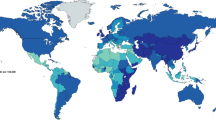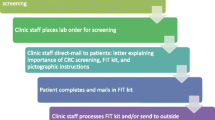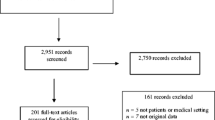ABSTRACT
Background and Objective
Patient-provider language barriers may play a role in health-care disparities, including obtaining colorectal cancer (CRC) screening. Professional interpreters and language-concordant providers may mitigate these disparities.
Design, Subjects, and Main Measures
We performed a retrospective cohort study of individuals age 50 years and older who were categorized as English-Concordant (spoke English at home, n = 21,594); Other Language-Concordant (did not speak English at home but someone at their provider’s office spoke their language, n = 1,463); or Other Language-Discordant (did not speak English at home and no one at their provider’s spoke their language, n = 240). Multivariate logistic regression assessed the association of language concordance with colorectal cancer screening.
Key Results
Compared to English speakers, non-English speakers had lower use of colorectal cancer screening (30.7% vs 50.8%; OR, 0.63; 95% CI, 0.51–0.76). Compared to the English-Concordant group, the Language-Discordant group had similar screening (adjusted OR, 0.84; 95% CI, 0.58–1.21), while the Language-Concordant group had lower screening (adjusted OR, 0.57; 95% CI, 0.46–0.71).
Conclusions
Rates of CRC screening are lower in individuals who do not speak English at home compared to those who do. However, the Language-Discordant cohort had similar rates to those with English concordance, while the Language-Concordant cohort had lower rates of CRC screening. This may be due to unmeasured differences among the cohorts in patient, provider, and health care system characteristics. These results suggest that providers should especially promote the importance of CRC screening to non-English speaking patients, but that language barriers do not fully account for CRC screening rate disparities in these populations.

Similar content being viewed by others
REFERENCES
US Census Bureau, American FactFinder. Available at: http://factfinder.census.gov/ Accessed August 19, 2010.
National Healthcare Disparities Report, 2008. Available at: http://www.ahrq.gov/qual/qrdr08.htm Accessed August 19, 2010.
Fiscella K, Franks P, Doescher MP, Svaer BG. Disparities in health care by race, ethnicity and language among the insured. Med Care. 2002;40:52–9.
Flores G. The impact of medical interpreter services on the quality of health care: a systematic review. Med Care Res Rev. 2005;62(3):255–99.
Lavizzo-Mourey R. Improving quality of US health care hinges on improving language services. JGIM. 2007;22(Suppl 2):279–80.
Collins KS, Hughes DL, Doty MM, Ives BL, Edwards JN, Tenney K. Diverse communities, common concerns: assessing health care quality for minority americans. The Commonwealth Fund, 2002. Available at: http://www.cmwf.org publication number 523 Accessed August 19, 2010.
Wilson E, Chen AH, Grumbach K, Wang F, Fernandez A. Effects of limited English proficiency and physician language on health care comprehension. JGIM. 2005;20:800–6.
Pippins JR, Alegria M, Haas JS. Association between language proficiency and the quality of primary care among a national sample of insured Latinos. Med Care. 2007;45:1020–5.
Chan KS, Keeler E, Schonlau M, Rosen M, Mangione-Smith R. How do ethnicity and primary language spoken at home affect management practices and outcomes in children and adolescents with asthma? Arch Pediatr Adolesc Med. 2005;159:283–9.
Cheng EM, Chen A, Cunningham W. Primary language and receipt of recommended health care among Hispanics in the United States. JGIM. 2007;22(Suppl 2):283–8.
Hu DJ, Covell RM. Health care usage by Hispanic outpatients as a function of primary language. West J Med. 1986;144(4):490–3.
Ponce NA, Hays RD, Cunningham WE. Linguistic disparities in health care access and health status among older adults. JGIM. 2006;21:786–91.
Harmsen JAM, Bernsen RMD, Bruijnzeels MA, Meeuwesen L. Patients’ evaluation of quality of care in general practice: what are the cultural and linguistic barriers? Pat Educ Couns. 2008;72:155–62.
Whitlock EP, Lin JS, Liles E, Beil T, Fu R. Screening for colorectal cancer: a targeted, updated systematic review for the US Preventive Services Task Force. Ann Intern Med. 2008;149:638–58.
Jamal A, Siegel R, Ward E, Murray T, Xu J, Thun MJ. Cancer statistics, 2007. CA Cancer J Clin. 2007;57(1):43–66.
Peterson NB, Murff HJ, Ness RM, Dittus RS. Colorectal cancer screening among men and women in the United States. J Womens Health. 2007;16(1):57–65.
Natale-Pereira A, Marks J, Vega M, Mouzon D, Hudson S, Salas-Lopex D. Barriers and facilitators for colorectal cancer screening practices in the Latino community: perspectives from community leaders. Cancer Control. 2008;15(2):157–165.
Diaz JA, Roberts MB, Goldman RE, Weitzen S, Eaton CB. Effect of language on colorectal cancer screening among Latinos and non-Latinos. Cancer Epidemiol Biomarkers Prev. 2008;17(8):2169–73.
Nguyen GT, Barg FK, Armstrong K, Holmes JH, Hornik RC. Cancer and communication in the health care setting: experiences of older Vietnamese immigrants, a qualitative study. JGIM. 2007;23(10):45–50.
Wee CC, McCarthy EP, Phillips RS. Factors associated with colon cancer screening: the role of patient factors and physician counseling. Prev Med. 2005;41:23–9.
Guerra CE, Schwartz JS, Armstrong K, Brown JS, Halbert CH, Shea JA. Barriers of and facilitators to physician recommendation of colorectal cancer screening. JGIM. 2007;22(12):1681–8.
Dunn AS, Shridharani KV, Lou W, Bernstein J, Horowitz CR. Physician-patient discussions of controversial cancer screening tests. Am J Prev Med. 2001;20:130–4.
Carcaise-Edinboro P, Bradley CJ. Influence of patient-provider communication on colorectal cancer screening. Med Care. 2008;46:738–45.
Ware JE, Kosinski M, Keller SD. A 12-Item Short-Form health survey. Med Care. 1996;34(3):220–33.
Hershey JC, Luft HS, Gianaris JM. Making sense out of utilization data. Med Care. 1975;13(10):838–854.
Wolf MS, Baker DW, Makoul G. Physician-patient communication about colorectal cancer screening. JGIM. 2007;22(11):1493–9.
Safran DG, Taira DA, Rogers WH, Kosinski M, Ware JE, Tarlov AR. Linking primary care performance to outcomes of care. J Fam Pract. 1998;47:213–220.
Etzioni DA, Ponce NA, Babey SH, et al. A population-based study of colorectal cancer test use: results from the 2001 California Health Interview Survey. Cancer. 2004;101:2523–32.
Sudore RL, Landefeld CS, Perez-Stable EJ, Bibbins-Domingo K, Williams BA, Schillinger D. Unraveling the relationship between literacy, language proficiency, and patient-physician communication. Patient Educ Couns. 2009;75:398–402.
Kazis LE, Nethercot VA, Ren XS, Lee A, Selim A, Miller DR. Medication effectiveness studies in the United States Veterans Administration health care system: a model for large integrated delivery systems. Drug Dev Res. 2006;67:217–226.
Acknowledgements
This research was unfunded. Results were presented in poster format at the national meetings of the American College of Preventive Medicine, February 2010, Washington DC and AcademyHealth, June 2010, Boston MA.
Conflict of Interest
None disclosed.
Author information
Authors and Affiliations
Corresponding author
Rights and permissions
About this article
Cite this article
Linsky, A., McIntosh, N., Cabral, H. et al. Patient-Provider Language Concordance and Colorectal Cancer Screening. J GEN INTERN MED 26, 142–147 (2011). https://doi.org/10.1007/s11606-010-1512-9
Received:
Revised:
Accepted:
Published:
Issue Date:
DOI: https://doi.org/10.1007/s11606-010-1512-9




